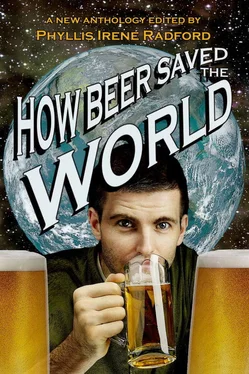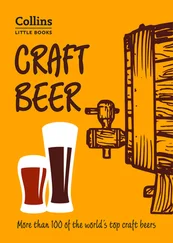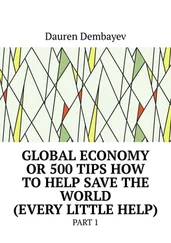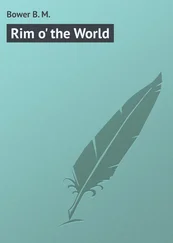HOW BEER SAVED THE WORLD
An Esoteric Anthology
Edited by Phyllis Irene Radford
How Beer Saved the World
Phyllis Irene Radford, Editor
And on the eighth day God created Beer.
Beer is what separates humans from animals… unless you have too much beer.
Seriously anthropologists, archeologist, and sociologist seem to think that when humans first emerged on earth as human they possessed fire, language, a sense of spirituality, and beer.
Some nice folks at the Discovery Channel proved it. http://topdocumentaryfilms.com/how-beer-saved-the-world/
Hammurabi loved beer so much he codified the making of it. Today micro brews and craft breweries rely as much on art as they do science to create marvelous treats for the palate and the psyche. In centuries past people had to rely on copper kettles and patience. You too can make an approximation of the original according to this article:
http://morebeer.com/brewingtechniques/library/backissues/issue2.5/hitchcock.html
Warning there is a reason why in our first story by Brenda Clough. Suri, the ancient goddess of beer, pours her nectar through a linen sieve and proffers a reed straw. So unless you like to chew your brew, stick with more modern recipes.
Fermented grains have been a mainstay of the human diet almost as long as we have been human. Increasing barley production for beer triggered the agricultural revolution and turned hunter-gathers into farmers. Dividing fields created a need for mathematics. Recording beer production and distribution brought about writing. The need to transport beer brought the wheel into play. Ancient Egyptians fed the pyramid builders one gallon of beer a day in place of bread. Beer replaced unsanitary water in Medieval Europe. Pasteur’s investigation of why beer spoiled led to the discovery of germ theory and a revolution in medicine. The need to brew lager cold created the need for refrigeration. Large scale production of beer brought about the modern factory at least a decade before Henry Ford. The list of how beer saved the world goes on and on.
The authors of “How Beer Saved the World” offer up a few of the instances, past, present, and future, on this world and on others. For, without beer we might still be still roaming the plains of Africa as hunter gatherers.
I leave you with another website that offers:
Our Lager,
Which art in barrels
Hallowed be thy drink…
http://www.urbandictionary.com/define.php?term=The%20Beer%27s%20Prayer
Below, Between, Above
Brenda W. Clough
The slope was endless and dry, a skidding descent of scree and dust that took three days. The sky above was hot as molten metal. Early on the third day he saw the streak of green in the valley that spoke of canals and crops, gods and men, but it was not until his shadow stretched out long and weary before him that he came to the first village. It was a humble one, farmers probably, but there was a single business: a brew-house marked by the sheaf of straw hanging on the wall. He ducked under the faded and tattered awning at the front, past the single crude bench set out for customers, and leaned on the narrow table that blocked the inner doorway.
“Suri,” he called. “I’m thirsty.”
All bars are run by Suri, as all kitchens are managed by Cook. She came out of the darkness beyond, a buxom woman no longer young. “You look like one who has traveled a long way,” she greeted him. “Can you pay, or do you beg?”
“I can pay.” He had not called on his purse for a long while now, but it still clinked. He shook out a dried-clay ball and rapped it with his fist. It broke open, releasing ten small chunks of silver marked with the assay cuneiform of the treasury of Uruk. He knocked the broken shards aside and swept all but one of the pieces back into the bag. The remaining silver bit was a month’s wage for a working man.
She made no remark about this flash of wealth–a good sign. Instead she took the largest pottery beaker from the shelf and set it before him. “Sit,” she said. “I’ll be right back.”
He lowered himself onto the end of the bench closest to the table, the best seat. When he loosened his sandals, the stripes of the straps showed dark against the white dust of travel. He unhitched the battle axe from his shoulder so that he could lean against the wall. The coolness of the mud-brick was like a welcoming hand on his back.
“You won’t need your bronze here,” she said. “We’re peaceful folk.” Under one arm she carried a cloth strainer, freeing both hands for the dripping earthenware pitcher that smelled deliciously of yeast. He watched as she poured carefully through the strainer into his beaker. “There’s the reeds. Give it a moment to settle out, and then drink your fill–I have plenty of this brewing.”
He was too parched to wait. He took a cut reed from the jar and stabbed it down through the foam. He sucked the brew down, cool and tangy-sour and fragrant—the food and beverage of the gods together. When he paused for breath, she was ready with the refilled pitcher. Again she poured through the strainer, and again he drank, dipping his beard into the foam.
The third time however she put her hand over the reed. “You owe it to my brew,” she said. “Let it settle! Beer is like the world, with the wild waters above and below–the best is always in the middle, between the froth and the lees. Besides, if you don’t burp you’ll bloat up like a toad.”
“Nobody,” he declared, “has ever compared me to a toad.” He belched, voluminously.
She laughed. “You sound like one. You’ve enough years to know the fumes rise better to your head, if you spin it out.”
“Do I look so old?”
“Old enough to not waste good drink.” She turned the strainer out over the slop jar, slapping the linen to get the sludge of herbs and chaff out. “Give it a chance, and my beer will restore the youth to your step.”
“In truth?”
“For a while, anyway.”
“Then it’s not what I’m looking for. Although it is good.” He positioned the reed in the middle and sipped. With the sediment collected at the bottom of the tall beaker, the beer was the best he had ever tasted.
“Tell me your quest, then.”
He saw she was distracting him–spinning him out, to slow him down. But the potent brew was already loosening sinews and tongue. A boy came in with a wooden baker’s paddle. On it, just out of the oven, was a flat barley loaf, crackling hot and crusted with delicately browned sesame seeds. Suri spread a clean napkin to receive it. She broke off a bit and pushed the rest toward him. “Your blade shows you are a hero,” she said, idly. “You are not Lugalbanda, back from scaling the World Tree to see the Anzu Bird. Clearly you are not Inanna, returned from her sister’s house in the Deadlands below. So what’s your story?”
Once, the mention of the goddess would have sent him into a towering fury, smashing crockery and kicking over benches. Now he was too tired. The smell of the toasted sesame seeds beckoned. He broke off a piece, saying, “I knew Lugalbanda.”
“So did I.” She chewed, and sipped from her own smaller beaker.
He gave this no credence–a rural barmaid who knew his father? But rather than arguing he took another deep drink, and spoke the heart’s truth. “My story would bore you. A hash of pointless combats and windy conflicts. I have wasted my life on braying idiocy.”
She leaned to glance at the level in his beaker. “But you have just come back from a quest. Was that pointless?”
“It was worse than pointless.” He tore off another hunk of the dark bread. “I had it, in my hand. The treasure we all quest for, the desire of the ages. And then it was gone. Through my own inattention and stupidity.” He bit down on the crust as if it were the bones of an enemy.
Читать дальше











